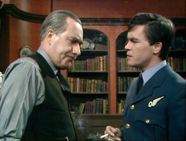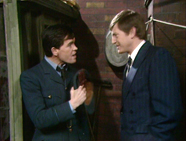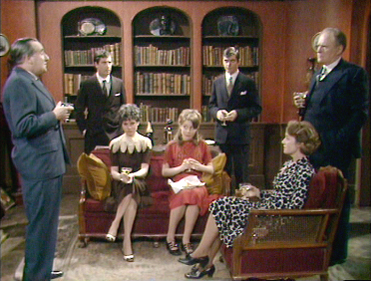You Can Choose Your Friends
by John Foster
Episode Number: 37 Director: Bob Hird |
CAST
| Edwin Ashton | Colin Douglas | |
| Philip Ashton | Keith Drinkel | |
| David Ashton | Colin Campbell | |
| Sheila Ashton | Coral Atkins | |
| Freda Ashton | Barbara Flynn | |
| Sefton Briggs | John McKelvey | |
| Margaret Porter | Lesley Nunnerley | |
| John Porter | Ian Thompson | |
| Helen Hughes | Georgine Anderson | |
| George Askew | John Savident | |
| Peter Bryant | John Collins | |
| Ian Mackenzie | John Nettles | |
| Colin Woodcock | David Bradley |
| The Briggs Home | Sefton's sister, Helen Hughes, comes in the front entrance, but when she hears Sefton speaking with solicitor George Askew, she goes directly up the stairs to her room. In the living room, Sefton tells George that Helen has arrived from Melbourne, turning up unannounced last week. Sefton suggests to George that he may very well sell the works to Dennis Pringle, who would keep Edwin on as manager. George reminds him that Edwin is a shareholder, so he will have a say in any company transaction. Sefton is not too concerned about Edwin, as he only holds a minority of shares, inasmuch as Jean saw fit to distribute her other twenty percent equally among the living children. He declares that Jean had agreed to vote with him—something George does not recall—but now the votes, in the hands of so many individuals, will be far less dependable. The shareholders in Briggs & Son Printing Company are: |
| Sefton Helen Edwin Jo Tony Margaret David Philip Freda | 30% 15% 15% 10% 10% 5% 5% 5% 5% |
| The RAF Base | David is in his quarters, packing for a two-day leave, when Peter Bryant comes in to request that David pay off his loan, so he can then satisfy his own creditors. No problem, says David, who explains that he has written to his uncle for a loan, so he will be happy to pay Peter back when he returns to base. David blames his monetary problems on Peter's sister, Grace Gould, whose expensive tastes and habits have drained his reserves. When David testily begins to write a cheque, Peter walks away, saying, "That's all right, Dave, cool down," adding with a sarcastic look, "I trust you." |
| The Briggs Home | Sefton invites George to the "welcome home" party that he is presenting for Helen that night, but George is reluctant to join such a family gathering, despite Sefton's recollection that George was once a bit soft on Helen. George asks whether Helen is here to stay, and Sefton indicates that he doubts that she would return to Australia—all the more reason to sort out the business affairs now, he reasons. Sefton is upset when George remarks that only "possibly" can he count on Helen's vote in support of his plans to sell the works. |
| The Ashton Home | John is ironing his slacks for Helen's party, and Margaret urges him to hurry, as it is nearly time to leave. Margaret asks him how his day's work was, and John tells her that the normal routine at the Treasury Department never changes. One bloke is retiring, however, to begin his own business, and John indicates that he might be interested in doing something like that as well. When Margaret offers to contribute the shares her mother left her, John retreats from the idea, saying it is only a pipe dream. |
| The Briggs Home | Helen comes downstairs and sees the enticing spread of food and drink that Sefton has arranged for her party. Brother and sister have a drink together, during which Sefton impresses upon her the need for adjusting to wartime changes, perhaps even going to work at the shop for the duration. Later, as Ian is driving Freda to the party, he divulges a confession while they are still in the car—that he has been married before. Freda informs him that she has known this for ages, there being few secrets in a nurses' home, and it makes scant difference to her anyway. That is just fine with Ian, for he does not especially want to talk about it to her. "And if you ever do want to talk about it…" says Freda, whereupon Ian finishes her thought, "…you'll be here to listen," and Freda adds with a knowing glance, "Well, it's beginning to look like it, isn't it?" Meanwhile, inside, Helen again eyes the food and wonders where it all comes from, to which George quips, "I think perhaps we shouldn't go too closely into that." Philip is surprised to see George Askew at the party until his father explains to him that George knew Helen from the old days. Edwin tells Sefton that David will be home on leave tomorrow, and Philip adds that it will only be for a couple of days. |
| The RAF Base | Peter has changed his mind, wishing for David to write the cheque after all, now that Gregson in the mess hall has indicated that David owes him ten pounds as well. When Peter seems wary of the cheque, stating, "I suppose it won't bounce, will it?" David can only utter a worried sigh. |
| The Briggs Home | All the guests have arrived, so Sefton offers a toast in honour of his sister, Helen. In the very next breath, he announces that this would be an opportune chance to have an informal chat, in order to consider "one or two prudent changes in the business." "I thought this was Helen's party," snaps Edwin, beginning to suspect that the family has been gathered under false pretences. But Sefton is insistent about discussing business while everyone is there together, claiming, "I don't think anybody's going to object to that, are they?" |
| David's and Sheila's Flat | Colin Woodcock drops in for a visit, and Sheila notes that he has put on some weight, indicative that married life has been good for him. Sheila agrees to pick up Colin's clean shoes for him, leaving them outside if she is not there to give them to him personally. When Colin inquires if things will work out between her and David, Sheila says she is pessimistic about their chances—not unhappy, but just resigned. Colin submits that he would offer to take Sheila to the pictures, but his wife would not like it, to which Sheila responds, "I always said you'd make a smashing husband for somebody." |
| The Briggs Home | When Helen wonders why her brother is so determined to sort out the business matters at once, George takes her aside to explain that Sefton needs the votes of many shareholders to push through his plan of selling the works to Pringle. "I gather he's counting on your support," states George as he walks away, and Helen says to herself, "Is he really?" |
| The Ashton Home | Philip, Edwin, and Helen figure they have half the shares, counting the Ashtons' thirty-five percent and Helen's fifteen percent—and it is conceivable that Tony and Jo also could desert their father. Edwin tells Helen that unscrupulous Pringle is even worse than Sefton, and Helen agrees that her brother has mellowed. Tired of struggling against Sefton for thirty-odd years—not to mention humouring him for Jean's sake—Edwin is tempted to concede the business to his brother-in-law and begin anew somewhere else, maybe even outside of Liverpool. |
| The Briggs Home | David comes directly from the base to Sefton's home, desperately supplicating his uncle for a loan. Sefton proposes that David consider selling his shares in the business, advising his nephew that they probably will not go up in value. Hearing this, David wonders if Sefton would be willing to buy the shares from him, in lieu of the loan. Sefton agrees to give David half of their value now, and then, after David meets with George Askew, the transfer can be completed at a later time. |
| The Ashton Home | Ian comes around to tell Freda that he cannot make their date tomorrow night because of commitments at the hospital. Freda relates to him that Helen's party was awful, and she has come to believe that her father regrets having been married to the wrong woman for thirty years. The Ashtons are not very lucky in marriage, she explains, but then she and Ian mutually agree that being together is different for them—certainly not a waste of time. |
| David's and Sheila's Flat | David arrives unexpectedly and tells Sheila that he has two days of leave. The couple have not talked since they were together in Wales for Janet's birthday, but Sheila contends that they said everything there was to say then—including word of the divorce. David disagrees that reconciliation is futile, repeating his statement that you can love different people in different ways, and he suggests Colin as an example she might understand. Sheila informs him that Colin is married now, adding, "Missed my chance there, didn't I?" Speaking frankly, David tells his wife that all he wants is Sheila, the kids, and a home. He begs her for another chance at marriage, claiming to possess some money his mother left him—enough to provide a decent place and bring the kids back home. Sheila has her doubts, but David asks her to trust him to behave properly as a husband. "All right," she says. "I don't believe it, but all right then. Only no more words, no more talk. Just do it." |
| The Ashton Home | Looking out the kitchen window, Freda tells Margaret that she can see activity in the garden—John clipping the hedge and Philip offering advice. Margaret is grading papers, complaining that school standards have fallen during the war because so many fathers are away from home. When Philip comes inside, Freda asks if she can borrow his old tennis racquet, and he says yes, that it is somewhere in the attic, if she cares to look for it. After she leaves, Philip tells Margaret that he expects to be posted soon, probably with his old unit on a second front. The front door slams, and David has arrived home to a warm greeting from Edwin, Margaret, and Philip. They all go to the living room to introduce David to his Aunt Helen. John comes into the kitchen, where he laments to Freda that he made a mess of the hedge, clipping it so low that the awful view of the gas works is no longer hidden. Soon thereafter, raised voices are heard from the living room, as Edwin scolds David for selling to Sefton his shares in the business. David protests that he needed the money, pleading, "How could I know?" whereupon his father shouts, "You never asked, David. You never think." When Edwin asks why David did not come to him for a loan instead of selling the shares, David replies that all he would have gotten in return is a lecture on avoiding debt. |
| The Briggs Home | Sefton tells George that it is time to get down to business, now that he has a majority of fifty-five percent. But George advises him not to count on Tony's ten percent quite yet, despite the fact that Sefton says Tony has what he calls a "moral obligation" to support his father. George cautions him that when Tony hears what has been going on in the family business dealings—especially with regard to Edwin's uncertain future with the company—he may not feel so morally obligated. David arrives, looking very tense and serious, so George can sense that it is time to leave. After George's departure, Sefton joins David in the living room, and David tells his uncle that he would like to buy the shares back from him. This Sefton is unwilling to do, moralising that David must learn an important lesson of life—to keep his word when it comes to business matters, irrespective of whether it is "all in the family." David re-phrases his appeal as a personal favour, but this too has no effect on Sefton, who stresses that David made a commitment, and he must stand behind it. Angrily, David shouts that he sold his shares before he knew that he was selling his own father with them. "I'm sorry, David," says Sefton with finality. "Those shares are mine now." |
| The Ashton Home | Edwin is determined to leave Briggs & Son, but Helen urges him to "thrash it out" with Sefton, which he agrees to do. When he criticises Helen for smoking too much, she explains that her bad habit began only when her husband, Tom, died—whereupon Edwin reflects that Jean too started smoking heavily when Robert was killed. Helen tells Edwin that Jean was no saint, and he should not treat her as such, adding that the best thing for them, as a couple, would have been moving to Australia with her. Edwin responds that he was tempted, but Jean would have none of it, which leads Helen to accuse him of being too soft, like a big Teddy bear, not standing up for himself. |
| David's and Sheila's Flat | David informs Sheila that he will be going back tonight instead of tomorrow, now that the row with his dad has ruined the leave beyond redemption. At least the money will allow her to move, he states, but Sheila tells him that she has stuck it for thirteen years, so she could stay there longer. David shouts that she can stay there if she likes, but he certainly will not, and neither will his kids. The kids will be staying with her, she argues, and she instructs David to shut the door on his way out. David grabs his cap and bag and stomps out, slamming the door behind him. There, face to face, he meets Colin Woodcock, who has come to retrieve his shoes. "Have you tried looking under the bed?" sneers David, and Colin accepts the remark like a spit in the eye. He snaps at David that he wanted to marry Sheila, but she would not have him. Colin declares that he is happy for Sheila, now that she has gotten David off her back, because, he adds, "She deserves a lot better than you." David accuses Colin of being very brave with his mouth, but he wonders where his uniform is. "The answer is, I don't have one," replies Colin. "Sometimes I'm glad I don't have one—like now, for instance." When David again taunts him for being brave with his mouth, Colin warns him not to push it because he could throw David through the brick wall. He would enjoy it too, adds Colin, but Sheila would not—and she is the one who has to live in this slum, thanks to David. David takes exception to this comment, but Colin says, "Spare me the excuses. I'm off," and he begins to walk away. But then Colin pauses long enough to tell David, "You think that I'm just a civvy on the make, right? Yeh, well, I know what I am. Do you know what you are?" David pounces upon him, but before any punches can be exchanged, Sheila comes out the door to put an end to the fight. |
| The Ashton Home | Margaret is worried about her father's upcoming confrontation with Sefton, but Edwin is determined to have it out with him, telling her, "I haven't the faintest idea what I'm doing, but at least I'm not sitting still." |
| The Briggs Home | Helen is an interested third party, quietly observing as Edwin meets with Sefton in the living room. Sefton explains to Edwin that he is only trying to protect his company's capital, but Edwin can see no further than the loss of his job. Edwin tells his brother-in-law that he turns out good print because he knows what he is doing, but he is too old to begin his career anew in a different field. Sefton grumbles that the decision already has been made, and now he is just trying to make Edwin realise that it is all for the good. Helen points out that her brother seems to be assuming Tony's support, and Sefton confirms that is the case. "There's more than a bit of his grandfather in Tony," he proclaims with pride, “and when it comes down to brass tacks, he's a Briggs. He'll see the sense in what I've got to say." The men close their discussion on acrimonious terms, agreeing only that the matter comes down to how Tony feels about it—that is, which way his ten percent will go. Sefton tells Edwin that he has his best interests at heart, but Edwin responds that it just seems to be a question of what his best interests are. When Edwin leaves, Sefton cannot help but notice that Helen is frowning at him. "Well, thank goodness that's settled," he says hopefully. "Tony's no fool, you know." Helen wonders aloud whether her artful brother already has spoken to Tony, and Sefton resents the implication. Noting that Helen—though only recently back from Australia—already is suspicious of his motives, Sefton frets, "Why is everybody always so ready to think the worst of me?" Sefton begins to march right out the front door, but then he changes his mind and goes upstairs instead. |
 |  |
| Script Excerpt 1 Sefton/David | Script Excerpt 2 |
